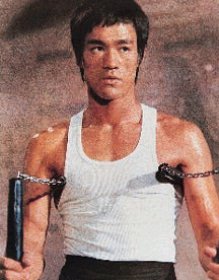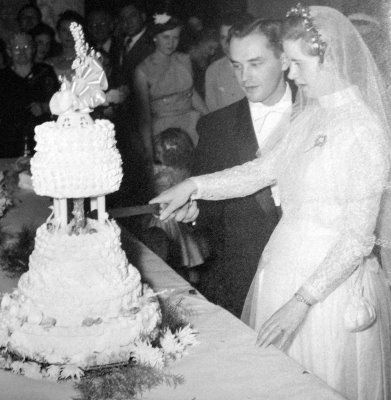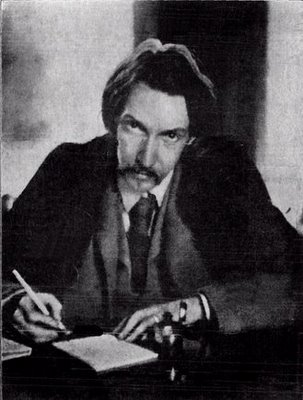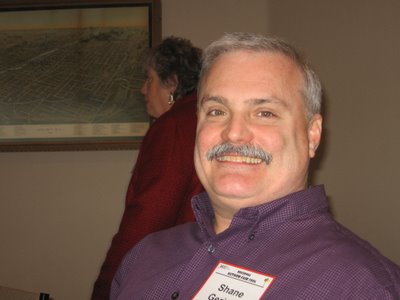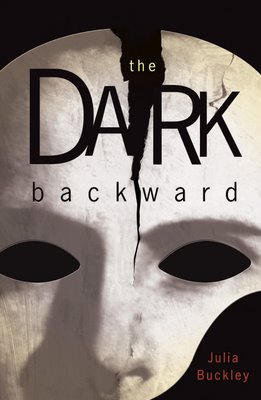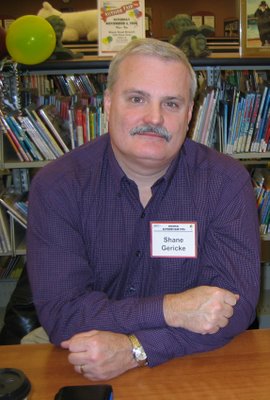 Hi, Shane! Thanks for chatting with me.
Hi, Shane! Thanks for chatting with me.You’re entirely welcome, Julia. I appreciate the chance to connect with your myriad fans and readers.
Your debut novel, Blown Away, shot to bestseller status. How did that happen? Naturally it’s well-written—but this doesn’t always guarantee sales. Do you have really amazing distribution? Intense charisma? A voodoo spell that you put on all of America? :)
I stared down America and chanted, “Look into my eyes … buy Blown Away … buy Blown Away …” But everyone heard “Eat at Joe’s” and left to get a hamburger. Sheesh. So I turned to blatant sucking up to get my story out.
Seriously, I wrote a good story, but I can’t take the credit for this success. My publisher, Kensington Books, and my editor, Michaela Hamilton, are incredibly supportive of me and my work. They talked up the book to everyone in the business, then distributed it worldwide. Distribution is key to sales—if people can’t find your book, they can’t buy it. Kensington sales reps worked overtime with book chains, independents and mass marketers, and the sellers reactedwith gusto—their decision to put my book in the front of the store because they liked it so much, for instance, is an endorsement worth its weight in gold. Then my publicist, Patti Nunn of Breakthrough Promotions, worked the media tirelessly to get the word out nationwide. The resulting reviews were, fortunately, marvelous, and Blown Away rocketed to No. 44 on the Barnes & Noble national bestseller list. The news hit me like the proverbial ton o’ bricks—and on my 50th birthday yet. Talk about your unique present!
Wow. That's awesome.
You and I grew up not far from each other, but never met before a few weeks ago, at the Joliet Book Fair. Isn’t life funny? What were your favorite hangouts as a kid?
Life is funny. Like running into you in Joliet, I’ve gotten amazing small-world vibrations since I started touring and connecting with folks. For instance, Joan Hansen, who organizes the Men of Mystery conference in Orange County, CA, invited me to be one of the 50 mystery authors who spend a Saturday talking to 500 readers. It’s a monumental—and quite rare—honor for a debut author, and of course I said yes. After dinner the first night, I wound up talking to one of her friends. Turns out that she and my father went to high school together in San Bernardino back in the 1940s. Of all the gin joints in all the world! A few hours before that encounter, I spent some time at the bar with thriller master Jeffrey Deaver, whom I’d not met before that moment. Turns out that he knows and greatly admires Michaela, my editor, and that he grew up five miles from where I live now in Naperville, Illinois. You can’t make this stuff up.
My favorite hangout as a kid in tiny Lincoln Estates, Illinois, was the Dairy Castle. It smelled like ice cream—as you’d expect—and since we grew up without air conditioning—a horrid trauma I still remind mom and dad about every chance I get—it was heaven stepping into that chilled parlor. With those wet dog summers we suffered in Illinois, I would gladly have worked at the Castle for free if I’d been old enough to avoid the child labor laws. I also used to love hiking along the railroad tracks to Frankfort, the nearest “big city” of 2,000. It was a couple miles each way, at a time (the Sixties and Seventies) when kids could stay out all day and half the night playing without anyone worrying a child molester had snatched him up. I’m delighted to live in the modern era, but not fearing Mr. Stranger Danger when you’re out playing is a sad, sad loss.
I agree.
Your one-line grabber for your novel is “Special Forces-trained serial killer rampages ritzy Chicago suburb in psychopathic quest to annihilate rookie cop Emily Thompson.” First of all, great action verbs, Shane! Second, it reads like a headline, heaven forbid. Is this the newsman in you emerging even in mystery sales?
Somebody smarter than me once said, Past is prologue. I agree. I spent 25 years as a newspaper editor and writer, primarily at the Chicago Sun-Times, before abandoning that perfectly good paycheck to write books. The skills that make a good newsman—persistence, observation, willingness to ask questions, writing fast and accurately, accepting editing not as an insult but seeing the forest for the trees, ability to translate sounds, sights and smells into taut, readable prose, and ability to drink gallons of bad coffee without staying awake all night—are superb training for book-length writing.
Besides, I loved writing headlines. My all-time favorite was “Jerked to Jesus,” for a news story about an execution by hanging. If those three words didn’t make you read the story, you’re brain dead. I didn’t write it, of course—waaay before my time—but I wish I had.
Shane is a cool name. Were you named for A) The character in the book Shane, by Jack Schaefer; B) The movie Shane based on the book by Jack Schaefer, starring Alan Ladd; or C) Other?
Thanks, Julia. I like it too. I came out in 1956, several years after Alan Ladd gave Jack Palance what-for on the silver screen. All the “regular” names—Mike, Pat, Tim, Frank and the like, were already taken by cousins, or by people my folks didn’t like growing up. Shane was fresh and new. So Shane I became.
It’s a great writer name. Some women won’t read male writers, some men won’t read female writers. Since Shane is neutral, everyone assumes I’m one of them, and my book gets read by everyone. Like Martha Stewart says, It’s a good thing.
I don’t sense that my book is reaching best-seller status yet. What shall I do?
You already have a great story, or it wouldn’t have been picked up by anyone. After that, you need a publishing house with heavy distribution muscle and willingness to use it, an editor who can fire up the sales force to promote your work, and booksellers across the country willing to push you to the front of the store. To bring in readers, hire your own publicist to lobby the media your publisher doesn’t, and pitch hard for reviews in Publishers Weekly, Library Journal and other review houses and fan magazines. Then chat up friends, family, business associates, club members, folks at the gym, EVERYONE, to buy your book and tell ten people they know. Put your postcards and flyers everywhere you go, do volunteer work to meet yet more folks, then pray to whatever God you believe in that it all comes together to push you onto a list.
Or, you can do what I did: offer to wash the reader’s car if she buys a book. Seriously, I did that. Nobody took me up on it, thank God for my banged-up knees, but it was an icebreaker that led to a lot of sales at book signings. I use whatever tricks I can to break through the feeling many passersby have that “oh, God, he’s going to make me buy something.” Of course I am, but I want them to feel good about it in the process.
All right, I've jotted down some notes.
Your book promises to “weld action, romance, and Baby Boomer board games into a taut psychological thriller that keeps readers guessing till the last page.” Okay, that second part sound s like familiar best-seller speak, but the board games part has me intrigued. Which board games are we talking about here?
The ones we all grew up with: Monopoly, Duck-Duck-Goose, Clue, Chutes and Ladders, Hangman, Timebomb, etc. I was scratching my head one day for a plot device to move this story along, and my darling wife suggested board games. Something clicked, and I started writing about a serial killer who uses board games to trap Naperville Police Detective Emily Thompson, my heroic lead and the killer’s object of hatred. It worked beautifully.
How does having a best-seller benefit you as a novelist? I’m curious about this as both a writer and a reader.
As an author, it bestows legitimacy within the industry, that you’re worth talking to. As a reader, it suggests that my book is worth checking out.
Novelists compete with movies, TV, video games, magazines, newspapers, doctor appointments, sex, arguments, yard work, school, and driving the kids around for the consumer’s time, money and eyeballs. If said consumer sees a book with “national bestseller” on the cover—preferably in embossed gold type—they correctly assume it’s worth taking a look. They’ll read the cover copy, become intrigued, and buy the book. It doesn’t always work out—some bestsellers are monkey dung written strictly for money (see: OJ)—but generally, to have bestseller status is to say you jumped all the hoops and landed on your feet. You are worthy of at least a few seconds of time. After that, it’s up to you.
Just never tell your wife that National Bestsellers don’t do laundry. Mine giggles whenever I try that. Which is good. When you start believing your own press releases about how marvelous you are, your writing starts to suck.
All right, I won't tell my wife that.
You are a founding member of International Thriller Writers Inc. Is Blown Away more of a thriller than a mystery?
Yes. Thriller master David Morrell describes a mystery as a who-dunnit and thrillers as a how-dunnit. In other words, thrillers don’t need to keep the Evil Bastard’s identity a secret while he’s Wreaking Havoc and the townsfolks have gathered to Rub Him Out. It’s nice if you can, but it’s not the end-all be-all like in a traditional Sherlock Holmes-type mystery, where guessing the killer’s identity is 90 percent of the reader’s fun.
Think of thrillers as mysteries on crack. They jump out of the woods, grab you by the lapels, and hurl you down the train tracks while locomotives charge your way, whistles screaming. When you try to roll off the track to avoid being flattened like an aardvark in a hurricane of hammers (see: Dan Rather), a thriller grabs you again and throws you under the wheels. And so on. The chase is the thing. The adrenaline. The clash of egos, hubris, passion, love, hate, honor, dismemberment by power saw—all those cool things that none of us admit to loving but yet the National Enquirer is America’s bestselling newspaper.
Thrillers are fun. We all like fun. That’s why thrillers work.
What is an average day like for Shane? (Not Alan Ladd, but you.)
Wal, little lady, I mosey on down to the saloon for a jawbone with Miss Nell followed by a gunfight with Black Bart … whoops, scratch that, you said me Shane, not cowboy Shane.
OK, my average day. I wake up around 8, roll out of bed, pad downstairs for my first cup of coffee, pad back upstairs to my office, cleverly disguised as a spare bedroom. Clear my e-mail, then start typing. The motion wakes up the characters in my head, and once they stop griping about the early hour, they start telling me their stories. I transcribe fast as I can. The day flies by with breaks here and there to throw in some laundry, answer more e-mail, attend a book signing or call into a radio show. And coffee, more coffee. The day flies by. My lovely and adoring wife with the wisdom of Solomon and patience of Job—uh, did I mention she has this great job with health insurance that allows me to handle my madcap career the way I see fit?—comes home late afternoon and one or both of us makes supper. Then we talk, watch some TV—we like 24, Law and Order, Cold Case, Without a Trace, Thirty Rock (Alec Baldwin’s the funniest guy on television) and Chicago Cubs games—read the morning papers twelve hours late, then head upstairs at nine to read, get ready for bed and . . . uh, well, you know, other stuff. When I need to do research, I stop writing and go do it. If I’m tired, I sleep late. It’s a nice way to live. I loved the newspaper business and always will, but damn those night-weekend-holiday hours are toxic!
Can you feel my envy through this computer screen?
What are you reading now?
Lee Child’s The Hard Way, Michael Connelley’s The Lincoln Lawyer, Joseph Wambaugh’s cop classic The New Centurions, Eric Larson’s Thunderstruck, his followup to the marvelous Chicago adventure Devil in the White City, your own The Dark Backward, which has one of the most compelling covers I’ve ever seen, and anything by John Sandford, my No. 1 favorite writer of all time and who’d I’d just die to have blurb one of my novels . . . hey! John! I’ll wash your car if you do! Honest! Call me! We’ll do lunch!
Wow! That is a list of writers I may never be on again--thanks!
There are some good restaurants out in the Chicago suburbs. What’s one of your favorites?
For dinner, the Weber Grill. Great steaks, healthy tumblers of Scotch, and a décor that evokes the North Woods. Can’t do better. For breakfast, it’s Grandma Sally’s in Naperville. Best omelettes in the whole universe.
Okay, you said your book contains romance, which means you’re at least partially a romantic. How did you meet your wife? How did you propose?
Jerrle and I met at Northern Illinois University in DeKalb. We both worked on the college newspaper, her as a sportswriter, me as city hall reporter. I’d love to say our eyes met and that was it, but I was so smitten I got obnoxious and pushy. We eventually overcame that, and have been married since 1979. She still won’t forgive me for sticking her with the unpronounceable last name of Gericke, though, when she had such a nice easy Miller. Coupled with “Jerrle,” everybody mangles both halves of her name now.
What are you writing now?
I recently sent my editor the manuscript for Cut to the Bone, the sequel to Blown Away. She’s 70 pages from done, and pronounces it remarkable. I hope that means “doesn’t need fixing” remarkable, not “we can’t publish this crap, you loser” remarkable. I assume the former, since we already have the cover and a pub date of June, 2007. After she signs off, I turn my attention to No. 3. I have, as you might suspect, plenty of twisted fun ideas.
How can readers find out more about Shane Gericke and his bestselling novel, Blown Away?
Check out my website, http://www.shanegericke.com/. There’s all sorts of things for readers to enjoy. I’ve centr
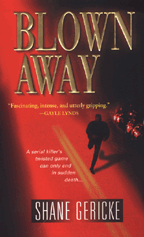 alized my reviews, press clips and other good stuff so readers don’t have to wade through 3,000 Google hits.
alized my reviews, press clips and other good stuff so readers don’t have to wade through 3,000 Google hits.The book’s available at any bookstore, or through online sellers like Amazon, BN, Borders and Books a Million. I strongly recommend checking out your local bricks-and-mortar bookstore, though. Without their support, readers and authors would be far poorer. In the author’s case, literally.
Thanks for the interview, Shane! This was fun!

